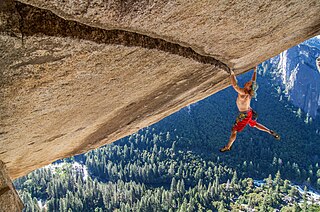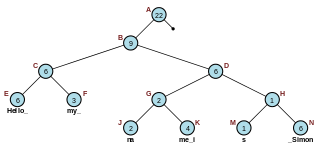
Climbing is the activity of using one's hands, feet, or other parts of the body to ascend a steep topographical object that can range from the world's tallest mountains to small boulders. Climbing is done for locomotion, sporting recreation, for competition, and is also done in trades that rely on ascension, such as rescue and military operations. Climbing is done indoors and outdoors, on natural surfaces, and on artificial surfaces
Cell most often refers to:

Gymnastics is a type of sport that includes physical exercises requiring balance, strength, flexibility, agility, coordination, artistry and endurance. The movements involved in gymnastics contribute to the development of the arms, legs, shoulders, back, chest, and abdominal muscle groups. Gymnastics evolved from exercises used by the ancient Greeks that included skills for mounting and dismounting a horse, and from circus performance skills.
Orange most often refers to:

Rhythmic gymnastics is a sport in which gymnasts perform on a floor with an apparatus: hoop, ball, clubs, ribbon and rope. The sport combines elements of gymnastics, dance and calisthenics; gymnasts must be strong, flexible, agile, dexterous and coordinated. Rhythmic gymnastics is governed by the International Gymnastics Federation (FiG), which first recognized it as a sport in 1963. It became an Olympic sport in 1984, with an individual all-around event. The group all-around competition was added to the Olympics in 1996. At the international level, rhythmic gymnastics is a women-only sport. The most prestigious competitions, besides the Olympic Games, are the World Championships, World Games, European Championships, European Games, the World Cup Series and the Grand Prix Series. Gymnasts are judged on their artistry, execution of skills, and difficulty of skills, for which they gain points. They perform leaps, balances, and rotations along with handling the apparatus.
Cord or CORD may refer to:

A rope is a group of yarns, plies, fibres, or strands that are twisted or braided together into a larger and stronger form. Ropes have tensile strength and so can be used for dragging and lifting. Rope is thicker and stronger than similarly constructed cord, string, and twine.
A horse is a hoofed mammal of the species Equus ferus caballus.

In computer programming, a rope, or cord, is a data structure composed of smaller strings that is used to efficiently store and manipulate a very long string. For example, a text editing program may use a rope to represent the text being edited, so that operations such as insertion, deletion, and random access can be done efficiently.

St Marys railway station is a heritage-listed former goods yard, railway signal box and now railway station located on the Main Western line in the western Sydney suburb of St Marys in the City of Penrith local government area of New South Wales, Australia. The station is served by Sydney Trains T1 Western line services. The station marks the end of the four-track section of the Main Western line. It was designed by New South Wales Government Railways and was built in 1862. It is also known as St. Marys Railway Station Group and St Marys Railway Station. The property was added to the New South Wales State Heritage Register on 2 April 1999.

Wire rope is composed of as few as two solid, metal wires twisted into a helix that forms a composite rope, in a pattern known as laid rope. Larger diameter wire rope consists of multiple strands of such laid rope in a pattern known as cable laid. Manufactured using an industrial machine known as a strander, the wires are fed through a series of barrels and spun into their final composite orientation.
Rope is a length of fibers that are twisted or braided together

Twirling is a form of object manipulation where an object is twirled by one or two hands, the fingers or by other parts of the body. Twirling practice manipulates the object in circular or near circular patterns. It can also be done indirectly by the use of another object or objects as in the case of devil stick manipulation where handsticks are used. Twirling is performed as a hobby, sport, exercise or performance.

The Ropes Creek Line is a closed railway line in the western suburbs of Sydney, Australia.
Ropes Creek, a watercourse that is part of the Hawkesbury-Nepean catchment, is located in Greater Western Sydney, New South Wales, Australia.

Ropes Crossing is a suburb of Blacktown, Sydney in the state of New South Wales, Australia. Ropes Crossing is located 49 kilometres (30 mi) west of the Sydney central business district, in the local government area of the City of Blacktown and is part of the Greater Western Sydney region.
Gymnastics is a type of sport.

The 2017 Rhythmic Gymnastics World Championships, the 35th edition, was held in Pesaro, Italy, from 30 August to 3 September 2017.










